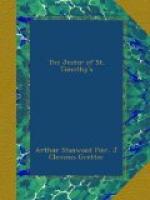He was quite subdued through that meal. Once in the middle of it, Irving looked at him and caught his eye, and on a sudden impulse leaned back and laughed. Carroll joined in, Westby blushed once more, the Sixth Formers at the next table looked over and began to laugh; the other boys cast wondering glances.
“What’s the joke, Mr. Upton?” asked Blake.
“Oh, don’t ask me,” said Irving. “Ask Westby.”
“What is it, Wes?” said Blake, and could not understand why he received such a vicious kick under the table, or why Carroll said in such a jeering way, “Yes, Wes, what is the joke, anyhow?”
When the meal was over, Westby’s friends lay in wait for him outside in the hall, crowded round, and began patting him on the back and offering him their jocular sympathy. To have the joke turned on the professional humorist appeared to be extremely popular; and the humorist did not take it very well. “Oh, get out, get out!” he was saying, wrenching himself from the grasp of first one and then another. And Irving came out just as he exclaimed in desperation, “Just the same, I’ll bet it’s all a fake; I’ll bet he hasn’t got a brother!”
He flung himself around, trying to escape from Collingwood’s clutch, and saw Irving. The smile faded from Irving’s face; Westby looked at him sullenly for a moment, then broke away and made a rush up the stairs.
CHAPTER VIII
THE HARVARD FRESHMAN
For two or three days the intercourse between Irving and Westby was of the most formal sort. At table they held no communication with each other; in the class-room Irving gave Westby every chance to recite and conscientiously helped him through the recitation as much as he did any one else; in the dormitory they exchanged a cold good-night. Irving did not press Westby for a retraction of the charge which he had overheard the boy make; it seemed to him unworthy to dignify it by taking such notice of it. He knew that none of the boys really believed it and that Westby himself did not believe it, but had been goaded into the declaration in the desperate effort to maintain a false position. Irving wondered if the boy would not have the fairness to make some acknowledgment of the injustice into which his pride had provoked him.
And one day at luncheon, Westby turned to Irving and with an embarrassed smile said,
“Mr. Upton, do you get any news from your brother about the Harvard Freshman eleven?”
Carroll directed at Westby the quizzical look under which Irving had so often suffered. But Westby did not flinch; he waited for Irving’s answer, with his embarrassed, appealing smile.
“I had a letter from him this morning,” said Irving. “He writes that there is a chance of their coming up here to play the School eleven; I had asked him if that couldn’t be arranged.”
“Oh, really!” exclaimed Westby, in a tone of honest interest.




